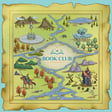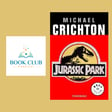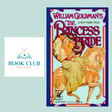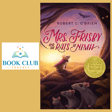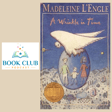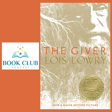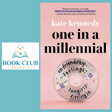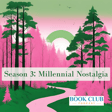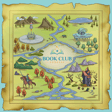Reflecting on Solarpunk: Insights and Challenges
00:00:09
Speaker
Hello listeners, this is our recap episode for Season 2 Solarpunk. I'm Caroline. This has been very interesting. This has been exactly what I wanted it to be. I feel like I got a real insight into all the different ways, even within this narrow category, that one might organize a society. That was what I wanted. It was exciting. What about you?
00:00:34
Speaker
I'm Carly and this season made me understand a bit more about the history of social movements that have actually had an impact on my personal life. Like I really had to get uncomfortable with some of these books to push against my assumptions and preconceived notions and really try to be open to ideas about how societies could be organized and like what human nature means
00:01:02
Speaker
So very satisfying group of books we had. Good. I guess we should list the books just in case someone, you know, isn't familiar.
Books and Authors: A Solarpunk Reading List
00:01:13
Speaker
Right. Sure. Ecotopia by Ernest Kalenbach. A Song for the Wild Built by Becky Chambers. Fifth Sacred Thing by Starhawk. Who did, and then Suncatcher.
00:01:26
Speaker
by Alia Gee. Alia Gee, The Disc Possessed by Ursula K. Le Guin, Emergency Skin by N.K. Jemisin, Seven Eves by Neil Stevenson, Earth It Bides by George Stewart, and Walk Away by Cory Doctorow. That was the order we read them into.
00:01:43
Speaker
Let's talk about the concepts of Solarpunk and the genre themes we talked about throughout. But we started with specific genre themes. What were the genre themes you expected going into it? Well, I expected creative and optimistic use of technology. I expected that societies would be organized along different principles.
00:02:08
Speaker
I expected those societies to be liberal and progressive, which I think we saw, particularly with the number and types of relationships and identities in every book. What else did I expect?
00:02:22
Speaker
I expected that there would have to be some sort of different relationship to meaning in life and also how one finds that meaning and what the basis of someone's self-esteem should be. I think our current culture, it's very much based on consumption and humans are status oriented animals. I wouldn't expect that to go away, but I think having status be oriented around
00:02:47
Speaker
things and buying and having the right sort of things that does seem like something that would need to change. And we did see that. That was very different in all of those societies. What else? What were you expecting?
Technology and Nature: Balancing Forces in Solarpunk
00:03:00
Speaker
Well, I was expecting utopias. And many of the books were utopia. Some of them were not. But I like that optimistic view of using technology, like technology as a net benefit to mankind.
00:03:16
Speaker
I'm used to dystopian stories and I've read plenty of science fiction that was supposed to be taken as a warning about the influence of technology on human society. I was really looking forward and really enjoyed the stories about technology as a positive influence on society. Another aspect of that that I feel like I didn't
00:03:40
Speaker
quite say initially is that while technology was important, I feel like that was balanced by one's relationship to earth and nature. I personally am generally unmoved by stories about what technology is going to do for us and how it's going to advance. Like that just by itself doesn't do much for me, but here it was so grounded in a very specific sort of connection to the earth that made it appealing to me.
00:04:10
Speaker
Well, you know, I've been to a lot of lectures sort of related to economics or like politics that I've talked about, like, no, no, technology is a benefit. And, you know, examples I'm used to hearing are how dishwashers and washing machines relieve so much labor, especially for women.
00:04:30
Speaker
And so I'm used to hearing about that in a very different context. I'm not used to thinking about that in stories, especially science fiction. Like in science fiction, I'm used to is it's either dystopian or the technology is just sort of background and it's cool and interesting. But thinking about the real societal impact of the way certain technology advances would have on our culture and like really thinking about we need to have clear intent
00:04:59
Speaker
You know, there's a lot of talk now about AI and there's a lot of fear around what AI will do. And so I like being proactive and thinking about the tradeoffs that AI can give us and making sure that our society evolves in a way so that technology does benefit. I mean, I guess I'm thinking about walk away here, that it does benefit everyone, not further create distance between
00:05:27
Speaker
the haves and the have nots.
Reordering Societal Priorities: Community Focus
00:05:29
Speaker
Yes. Along those same lines, what I enjoyed the most was how open these books were about, hey, we have to reorder our priorities. I mean, not just on a social level about, you know, what gets funded, but internally, emotionally, personally, we have to decide that our status or, you know, this particular type of creature comfort
00:05:54
Speaker
are not worth more than making sure that everyone in the society has what they need at a baseline to flourish. And that to me is part of the nitty gritty of these conversations, right? It's one thing to debate policy or economics at large, but the real question to me always has been, well, what are you, what am I willing to give up?
00:06:16
Speaker
Like, let's name those things now. And I think that's actually been one of the best parts of this book. It's helped me name those things. And some of them I named them and I think, yeah, that's true. I can give that up or I should work on that. Or I think, ooh, that's, I'm not going to do that.
00:06:33
Speaker
Right? And that's been some of the benefit here. Right. Yeah. I feel like I should probably provide examples to go with that statement. So I think it's one thing, for me, the idea of giving up status based on consumption seems justifiable and straightforward. Easy almost in a way.
00:06:53
Speaker
giving up something like my privacy, maybe to have either denser living or communal living that would build a greater sense of community. I can see the argument for it. That's a harder one for me personally to want to give up. Were there any similar examples for you? I know you agreed with me on the privacy one. Yeah.
00:07:12
Speaker
Well, I think the other than that, the other most uncomfortable thoughts coming up in these books are like the idea of getting rid of money, because I don't think that money is inherently evil. But I think a lot of the philosophies presented in a few of these books would take that stance. I mean, clearly, again, in Walkaway, she's very explicit about it. But I think in a few of these books, money is not important.
00:07:41
Speaker
Having a gift economy is a huge intellectual leap for me. Like, I just don't have a lot of faith that that would work. So I'd like to see it in practice. But yeah, reading these books has made me think more carefully about like, I'm not going to reject that idea. I'm going to think about it more clearly about like, if we really wanted a gift economy, first of all, I'm not sure that's what I want.
00:08:05
Speaker
But if I was in a community of people who I valued who wanted a gift economy, I would be more open to thinking about how to get there and make sure things are run smoothly and justly, I guess.
Labor, Identity, and Societal Expectations
00:08:18
Speaker
Another one that I sort of struggled with, I could see the argument for
00:08:23
Speaker
in some ways, but in some ways it was too close to the bone, was also in walk away, the idea of giving up your conception of yourself as special. He called it snowflake status, which was kind of an annoying phrase. But I can see the argument there, right? And it very easily translates to a lot of the other arguments that I just made, such as, well, why should I get to have, you know,
00:08:48
Speaker
a third car when some people don't have housing or, you know, et cetera. Whatever example you want, right? You know, that argument itself is aren't we all equal in some fundamental way? But then also, yes, I do think I'm special, right? Like we all do. Not in that way. I don't need three cars, but in other words, yes.
00:09:05
Speaker
No, but like in some of the earlier books, like I'm thinking of a fifth sacred thing. Like the fifth sacred thing, there's a lot of real deep, primal love for your family, for the fruits of your labor, for community. And you're talking about special snowflake lists. I think the snowflake commentary in Walkway is about do you have the right to decide things?
00:09:31
Speaker
for people or things that have impact on greater society. Like the clearest example is like if you make a lot of money and then you donate to charity, like why do you have the right to decide which charities get resources? And that's really hard because we're so used to thinking about like you earn the money, you earned it through your labor and therefore you get to decide what happens with it. And
00:09:54
Speaker
and walk away broke with that concept. I don't think that other books went that far. There was a real love of labor for labor's sake in some of the other books, but it was still yours. Well, kind of. The dispossessed, they talked a lot about labor and you're supposed to do what you're good at and be free to pursue what labor you want to do.
00:10:16
Speaker
But as a matter of fact, they were often kind of shuffled around as society needed and they'd be sent out and work, you know, this paper factory for six months and they go somewhere else. You know, there's kind of an alienation from labor there. They weren't choosing and they weren't getting to enjoy the fruits. And there was certainly a lot of shame about you thinking you were entitled to more.
00:10:36
Speaker
There was even that example where the main character had spent, hadn't eaten for two days. So he ate extra in the communal kitchen and he hadn't eaten for two days because he was working for the society and he ate extra in the communal kitchen and he felt like he was shamed for that. So some of them had, in addition to walk away, had a separation between your labor and you should enjoy it and you should get the fruits of it, whatever that means.
00:11:01
Speaker
right also in the dispossessed chevak writes this brilliant physics paper and gets upset he doesn't get credit for authorship like his mentor is also listed as an author and his mentor didn't do anything for that paper so it's like that kind of
00:11:16
Speaker
credit. I don't, it's not exactly status, but it's like a sort of possessiveness over reaping the rewards of your labor. And I don't know what I think about that. Like I do, I kind of sympathize with the idea of like, just because you make a lot of money, doesn't mean that you have some divine purpose to distribute that money, right? Like, I don't think
00:11:44
Speaker
people who make a lot of money in our current society, yes, their talents are valued in some way. And that's sort of how the economics fall. But I don't think there's any sort of like divine, like bestowal of gifts necessarily because of the size of your paycheck. So I'm there, but I'm not as far as like the dispossessed I don't quite connect with. Right.
00:12:08
Speaker
I think we're in agreement that money, just because someone can earn money doesn't mean they really either deserve the money or they deserve to have the power that it can bring, like with donating to charity.
Community vs. Individual Desires
00:12:19
Speaker
But I think there are more in between examples, like someone who is
00:12:23
Speaker
has a skill, like let's say medicine, that they've spent a lot of time developing, but is also for the good of the community and is very necessary and needed. It somewhat makes sense the community would have a say in where that skill is used, right? Like if it's needed here versus there.
00:12:39
Speaker
but also that may start to conflict with some of the walk-away philosophies, right? Sure. Yeah. I mean, so the question is, how does a society communicate where that medical need is, where that medical provider should go to have the most impact? But what if that medical provider, like we talked about this in the disabilities too, like Shevak's partner, whose name I can't remember, but it was a very harsh, lots of consonants in that word. Oh, Takfer. Her name was Takfer.
00:13:09
Speaker
So when she like she had the skill to cultivate algae, which could, you know, solve problems for their huge famine that they went through, but she was also breastfeeding a child. And so dividing her labor between breastfeeding her child or like cultivating algae, there was a conflict there.
00:13:29
Speaker
And so it's like, you know, maybe this gets into one of our genre themes of what makes a good society. Like in a good society, what is the outcome we want when there's that kind of conflict? And which of the books gave us the best examples of how to resolve that kind of conflict? How to put the people with the skills in the place where their skills can be used? Well, the dispossessed addressed that very directly in the way we discussed.
00:13:55
Speaker
The fifth sacred thing didn't address that. It just seemed that it trusted people would go, would want to go where they were needed and would figure it out. Walkaway would hate the idea of anyone being told where to go or even maybe being expected to go somewhere. I think in ecotopia, they had sort of management bodies who would figure out where someone was needed and they would tell people and those people would accept it and they would go. I don't know that the others addressed it, right?
00:14:24
Speaker
Sure. In ecotopia, it seemed like there was a lot of freedom to switch careers if you wanted to. I don't know that we got examples of that, but I don't remember any particular explanation to say that that would be frowned upon. That's true. You could work or not and switch work as you wished.
Societal Coercion and Cultural Perspectives
00:14:44
Speaker
Well, there were no limitations preventing you from switching jobs in the dispossessed either other than social disapproval, which it turns out is quite
00:14:53
Speaker
quite coercive right right so you know that gets to one of my answers what makes a good society is minimal coercion that's in my opinion
00:15:04
Speaker
Yeah, I know I just said that the dispossessed showed us that social pressure is also a form of coercion, and I'm not pro coercion, but I don't know that that by itself is the litmus test for me. I think it's something more like, can people lead rich lives? In my opinion, to read a rich life, you have to have some degree of freedom and variety and ability to change what you're doing and such. So maybe it comes out the same, but I don't know that coercion itself is the
00:15:32
Speaker
is the number one test for me. I think it's something much vaguer, like human flourishing. Well, I find that interesting because in my mind, if a person is being coerced, then they cannot find for themselves what will help them flourish the most, right? Like I do, I do recognize in Ecotopia, this was clear, our narrator, like he couldn't see the decision before him to stay in Ecotopia.
00:15:57
Speaker
until his friends kidnapped him and made him hang out in a spa until he had the self-realization. And then he understood, oh, I will flourish if I'm an egotopia, and then he could make the decision to stay. So that doesn't feel like coercion to me. They did limit, they did kidnap him, but it was in a...
00:16:18
Speaker
context of caring for him and making sure that he made the decision for himself. So that didn't feel like coercion. I can't separate that from human flourishing. Like human flourishing, for me, must have the freedom to choose your own path and because only you can understand how you will flourish.
00:16:37
Speaker
No disagreement with that. I just think there's more levels of coercion and more levels of productive limitation where the difference is hard to see. Currently in the US, we require that children learn to read, that they go to school and they get a certain minimum amount of schooling. I think there's a very strong argument that opens the path for greater freedom going forward, but it's coercive. I also think there
00:17:03
Speaker
absent things like the gulag and executions for little to no reason. I think there are a lot of internal forms of coercion that people, they're due to themselves or participate in because we're social people, we're born into certain families, we want to have high standards for ourselves, we guilt ourselves, et cetera. So to me, there just ends up being a plethora of overlapping limitations, some of which are good, some of which are bad, some of which are time limited, some not.
00:17:31
Speaker
Yeah, but those limitations, some of the ones that you listed were not an effect of a societal-wide structure. They weren't institutionalized. I understand being part of a family, being part of a community, you feel pressures in a certain way. And we saw that in A Fifth Sacred Thing, we saw that in Suncatcher, the interpersonal relationships, but it's different when it's in the dispossessed, where it's a societal institution
00:18:01
Speaker
And we're talking about what makes a good society. I agree that choice and freedom are an important component of that. I just don't think coercion is, that's not my touchstone. That's not the definition to me that's most useful, but I'm being very vague in what I think the goal is. So it's fair to be annoyed by that.
00:18:20
Speaker
Yeah. Well, do you want to talk about societal change?
Timeframes of Societal Change
00:18:24
Speaker
We saw different timeframes. We saw at the beginning of a new society in a couple of books, we saw a hundred, 200 years later, we saw thousands of years later. Yeah. Fifth sacred thing talked about.
00:18:36
Speaker
over coming 5,000 years and that it might take 5,000 years to do that. To make an effective change basically. Yes, walk away. I would argue that walk away actually took place right before the societal change because there's so many references in that book to early days of a better nation that I don't think the good society has arrived yet.
00:19:01
Speaker
Yeah, but they're, but they're making the effort to, to make it change. Yeah. Right. And then seven Eves obviously had a, what was that a five or 10,000 year time leap. Right. Yeah. Yeah. So I think there were a lot of questions bound up in that. Like how long does change take? We saw some of those examples, but then also how does that actually happen? What is the inciting event or does it require an inciting event?
00:19:27
Speaker
Yeah, it's interesting in Walkway, the inciting event is a movement of people pushing for change. True. Yeah, so that's really different from the other books, I think. Yeah, I think generally one of my casual definitions of Solarpunk is that they are responding to climate change, that that generally is the inciting event as it was for
00:19:50
Speaker
Egotopia, Fifth Sacred Thing, a couple of others maybe, although there were kind of vaguer references to what it was in those. Emergency skin. Yeah. For sure. Yeah. So to talk about societal change, when does societal change happen? In these stories, we have individual characters responding and making changes. Like you can't have one without the other. Right.
00:20:14
Speaker
Well, true. But one thing I noticed in these books where there was a big event like a climate change or climate catastrophe is that sort of like an alien invasion, it brought people together, brought people together because it was an external threat. But then unlike an alien invasion, I think it's implied in several of these books that people had to ask what they were doing wrong.
00:20:36
Speaker
It holds a mirror up to society in ways that other catastrophes and changes don't. So I think, you know, if your inciting event is climate change, it can be uniquely powerful. Even with 70 years where it's kind of climate change, but it's not manmade climate change that caused the catastrophe. But even there, you had people disagreeing on how to respond to it. I find that part fascinating, though, like conflicts.
00:21:00
Speaker
I think that was the only book that really talked about those conflicts. In the other books, people sorted themselves into the society that agreed with the right response and they stayed there. In Fifth Sacred Thing, there were people who responded differently that they went to the war with.
00:21:18
Speaker
Right. So it's like they were still contenting with people who wanted to make different decisions. I mean, even in Earth Abides, they had to think about people who responded differently. And they actually like, I wonder if you could say even in Earth Abides, that within the tribe, people disagreed and still were able to live together in peace, essentially. Yeah.
00:21:40
Speaker
One of the other takeaways for this book, we'll talk about this later, but for this season for me is thinking a lot about how people resolve disputes in a nonviolent and non-litigious way. But that's one of them, right? How do you work it out as a society? What you agree the next goal is, or what is a sufficient level of agreement, even if not everyone's on board? Those are important questions.
00:22:06
Speaker
We talked a lot about trade-offs. I think that's always part of it. It's like, can I trade being right about the situation if it means that we move together as a group?
Conflict Resolution and Cooperation
00:22:18
Speaker
Or in the 70s, there wasn't a lot of room for disagreement and the disagreements ended up that they only had eight living people at one point.
00:22:27
Speaker
And so at that point, they had to work together. Right. But in the other books, you know, people were free to walk away and the dispossessed not so much. The character who had strong differing opinions ended up in an insane asylum. Yeah. So what do you do when you can't walk away? You know, no one can walk away. We are sort of forced to figure this out together to the extent we can. Right. A decent metaphor for climate change.
00:22:54
Speaker
Sure. Well, it's, wow, it's really stressing me out. Actually, like, you know, I think about in Seven Eves that the end of one, you know, that we only have one Earth, we can't test and experiment 1000 times and see which
00:23:11
Speaker
inputs produce the best output, you know, it's like, we have to have faith. That was a big thing that came out of the season that I wasn't thinking about because, you know, I have been faithless, I guess, for a while. Like, I was like, it's all science. I don't believe in things. But the idea of like, I didn't have any concept of what faith meant. I was really like struggling with that. But the idea of faith that we have one Earth
00:23:36
Speaker
We have one life, one chance to do the right thing as far as making sure that there is a future for our future generations. You have to have faith that you're making the right decision.
00:23:48
Speaker
You have to have faith that there will be a future, right? Yeah. Yours and others, I guess. Your actions are going to bring about the best possible future, if you can. If you act, right? Yeah.
Human Nature and Societal Structures
00:24:01
Speaker
You just stated it in the most universal way possible, but that was another ongoing concept or theme, right?
00:24:10
Speaker
recognition of humans as natural, somewhat even say animal creatures, and then also a strong connection with natural laws and cycles.
00:24:21
Speaker
Yeah, and that balance between feeling like one small part in a very large ecosystem, and then also feeling like you have the choice to step outside of that with machines, with technology, insulating yourself from the effects of nature. Right, which has a limit, which maybe we are meeting. Right.
00:24:48
Speaker
It's interesting for such a hopeful genre. It's about limitations too, in large part. The limitations of society, of technology, of humans. I mean, we still die and grieve and suffer and have physical bodies that go through all those changes. We're still very susceptible to things like the weather, the breeze.
00:25:10
Speaker
Mm hmm. The sun. Yes. Yeah. Do you want to get into takeaways? Yeah.
Favorite Books and Emotional Responses
00:25:17
Speaker
Yeah. I mean, I think the first question we got to answer is which book did you enjoy reading the most? For me, it's Psalm for the Wild Belt. That was just the most pure. It says right on the cover of the book that it's just like a delightful enjoyment. Like it is. And it was. Yeah.
00:25:35
Speaker
uh for me it's fifth sacred thing just such a beautiful spiritual bath in good ideas and good people and i could just read that over and over i loved the fifth sacred thing for sure but i mean i did a lot of crying in while i was reading that book too like yeah that's true there's there's some hard stuff a song for the wild bill i will also reread that one because it was just charming right like i just felt good yeah the whole time yeah no crying
00:26:03
Speaker
So did your opinion of any of the books change between reading the book and then our discussion of the book? I think there were two that were like that. Suncatcher and Seven Eves and for similar reasons. I didn't particularly enjoy reading them because the world building was either kind of overstuffed or over described.
00:26:22
Speaker
But then our conversations were able to pull out the threads that were meaningful, and particularly with Suncatcher, I saw that there were layers and connections between this very baroque and in-depth world building. What about you?
00:26:38
Speaker
Yeah, I think I agree, Suncatcher. I've enjoyed our conversation about Suncatcher. There were a lot of good ideas that came out of it, but the act of reading it was a little bit of a chore sometimes. Is that the book you'll never read again? Yes.
00:26:55
Speaker
probably. Although now like I feel like it would make a really good TV scripts like mm hmm or movie scripts. There was so much there. Maybe I should try writing a screenplay based on that book. Yeah, although I bet the rights already belong to someone. I don't know it'd be an interesting exercise. I would read later books by that author because that was her first book.
00:27:17
Speaker
And as far as I know, only yet. But I would read a future once. I would maybe have some faith that the things I disliked in that style would sort of get cleaned up over time. For me, the book I will never read again is Seven Eves. And I will also, to be honest, never read any Neil Stevenson either.
00:27:38
Speaker
Oh my goodness, you're breaking my heart. I know, I know, because you've told me there's so many ideas in his books. I've heard about some of them from you for other of his books. I just cannot stand that over descriptive style about the technology and the setting, not even about people.
00:27:57
Speaker
What if one of his books was made into a movie or TV show? Would you watch it? Oh, probably. Because ideally it would have the ideas, but not the pros. And perhaps the actors could make the characters more lifelike. So yeah, that might solve a lot of problems.
Market Influence and Era of Publication
00:28:13
Speaker
We tried to do classic, bestseller, indie. I don't think we had a young adult book this season. I think Song for the Wild Build or Suncatcher would qualify. Okay. Did you notice any different emphasis based on like what the market was for the book?
00:28:29
Speaker
I wouldn't say that. I definitely noticed that the older books that would be Ecotopia and Earth Abides were definitely from a white male viewpoint and fairly limited in that regard. And then as they got more recent, they seemed to incorporate more viewpoints and identities, even though they were all written by one author. So I noticed that. And then the thing I just said about Suncatcher, which is that that was, I think, our indie book. And it was also her first book.
00:28:57
Speaker
I would watch that career as it develops, whereas a lot of the older authors, that's not true because they're not recently published first authors. Are there any authors that you want to read more of? I mean, Starhawk, I love her work. That book is actually a trilogy, so I've read that and I will happily reread that again.
00:29:17
Speaker
And then she has also a lot of nonfiction on all types of things. She's a practicing witch, so there's a good bit on that and on rituals, but there's also actually a good bit on community building, how to resolve disputes without having an appointed leader, how to build meaningful things like rituals together with other people and not just dictating it. So all of that is amazing. Cool.
00:29:43
Speaker
Yeah, I think definitely Starhawk. I'd love to read more Becky Chambers. Same. Yeah. She's prolific. Do you want to talk more about societal change?
Sustainable Societal Change
00:29:54
Speaker
Yeah. So there was, and this just kind of goes with general review thoughts, I guess. We've talked a lot about societal change, what needs to change, how people and individuals and institutions need to change. There's so much that needs to be left behind, et cetera. Like we've talked about this for nine episodes.
00:30:11
Speaker
I think now we said that rather lightly, given the context it was in that made sense. But it's really quite risky in some ways to say that there are whole pieces of a society that need to be changed and gotten rid of. And what brought this up was that I recently have started doing more reading about cultural revolutions.
00:30:32
Speaker
like in the Soviet Union and in China. And those are examples and the French Revolution of times in history where people decided, hey, we need a clean break with the past. We need the new society to be fundamentally different in many ways or in every way. That led to a lot of violence and instability because they felt that they had to, in order to reach that shining new future,
00:30:55
Speaker
They had to cut down so many of the things that were giving strength in the current, like the family or existing social structures. You know, there ended up being too much policing of each other and punishment for bad thoughts and stuff like that. So I've been, that made me think back to how often we've said things like, well, this needs to change or people need to think differently.
00:31:18
Speaker
And so now I'm thinking about how do you make a big change, but in a more sustainable and safe way, meaning that people change, right? It's not forced on them at all. And I don't have the answer to that. Well, other than that, some of the answer is things like books like these and discussions of books like these that make people think and about what they want, the society they want, but
00:31:41
Speaker
You know, people have to choose it. You can only get the word out there and hope that they do, right? Do you think that making personal changes and like just living your life according to your values can have an impact?
Personal Lifestyle Changes and Leadership
00:31:54
Speaker
Like, is it even worth it to just start with that?
00:31:57
Speaker
Yeah, of course. Yeah, I'm not one of these people who thinks that, well, most pollution is caused by giant companies, so don't do anything. It's not necessarily the degree of impact on a discrete thing. It's the fact that you're choosing something better and other people see that also. But I think it's not just enough to do those things like recycling or
00:32:22
Speaker
promoting a better relationship with labor or name any of the things that you can name. I think you also have to talk about it and get other people to talk about it and share and create art that does those same things. The example is good more than that is also required, I think. What do you share?
00:32:39
Speaker
Yeah, that makes sense. Really wanting to just like dive back into Psalm for the Wild Belt and just like make tea and grow herbs and not have to think about other people making their decisions. Yes. Okay, so if someone is only going to read one of these nine books, which one would you recommend?
Recommended Solarpunk Reads
00:33:02
Speaker
The idea is to convey the solar punk spirit. I would say fifth sacred thing. It had the biggest impact on me, I think. I think that conveys the emotions and the experience of what it would be like to live in one of those societies the best. Oddly though, that's not my answer as much as I love that book. For me, I think it's ecotopia.
00:33:27
Speaker
because it's short, but it carries an overview of everything that would get you thinking about how society could be differently organized and what it would look like to have, you know, this particular, the forestry sector organized differently or, well, what if the schools weren't based on such competition heavy lines, then, you know, children would grow up differently.
00:33:48
Speaker
I think ecotopia is sort of the best little primer. Sure. No, that makes sense. And what was the best discussion? I think it was emergency skin. And that might be kind of cheating because it was like a short story. So we kind of launched off into our own conversation afterward. But I remember having a very good conversation about really what would we give up and what do we feel guilt about what we're not giving up. So since I remember it, I figured it was impactful and therefore the best. What about you?
00:34:16
Speaker
I loved our discussion on 70s. I mean, it was pure self-indulgence for me because I love that book. And I loved having a guest. That was also a very good discussion. I remember talking about identity and what qualities of humanity should be preserved for the future. And that has really stuck with me. I do like that. OK. So going forward, what sort of topics, like nonfiction topics, are you interested in?
Inspired by Societal Movements
00:34:44
Speaker
Well, I already said I really want to spend some time reading about people who are making tea and growing herbs and not doing anything much more difficult than that. That sounds great. I want to break from the deep thoughts for a little bit. Yeah, fair. So I think for me, I already mentioned one. I'm very interested now in the history of social movements and the history of revolutions, both the ones that did not work, the ones that worked too well and didn't last.
00:35:13
Speaker
and the ones that worked and lasted. I think it also, all of this reading really lit a fire in me about mediation and dispute resolution. Because in every one of these books, there's generally no authority figure who walks in and breaks up fights or helps people resolve a dispute. Someone just
00:35:33
Speaker
has these skills and steps forward and does it. That is the good economy version of my job. I'm just fascinated by that. I want to do a lot more reading on what those skills are, how you develop them, how they exist in a vacuum of authority, which I assume means you have to get people to buy into it, all sorts of things. Those things are my
00:35:57
Speaker
current interests going forward. Cool. And what books do you want to read more of? What kind of books do you want to read more of after this? I want to reread some of these books, like Fifth Sacred Thing, Song for the Wild Bill. And I want to read even more fiction like this. I haven't identified the books yet, but these sort of hopeful descriptions of other societies is what I really need right now. What about you?
00:36:20
Speaker
A lot of these books have sequels. And so I want to read some of the sequels. I don't know if I'll read all of Ursula K. Le Guin, but I am kind of intrigued by the world that she has built. Yeah. Because she has many other books about with this whole history of like the origin of humankind not being from Earth and these alien planets and how they work together. So I'm curious about that.
00:36:43
Speaker
and then the Becky Chambers. I'll read her works. It's like the three, well, not the only three women authors, but three of them have a lot of other books I want to read Ursula K Le Guin, Becky Chambers, and Starhawk. Well, and also I do want to read, I think it's a prequel to Ecotopia. I'm curious about that. Oh, I didn't know there was a prequel.
Season Wrap-Up and Future Plans
00:37:05
Speaker
Yeah. So this concludes our recap episode and season two on Solarpunk. We are going to take a break before season three, but we will continue posting in our Substack newsletter. You can subscribe to that at bookclubpod.com. If you are new to Substack, you should know that it's a great app.
00:37:23
Speaker
But you don't have to download the app to read our newsletter. All you need is an email address. And if you want to support the podcast, you can sign up for a paid subscription. And we are very grateful for our paid subscribers. So thanks to all of you who are paying for our Substack subscription. You're helping to support the podcast. The Book Club podcast is produced by Carly Jackson and Caroline Gorman. Music and audio editing by Alex Marcus. Thanks for listening.

